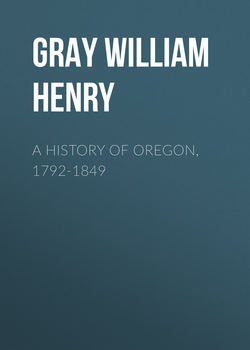A History of Oregon, 1792-1849

Реклама. ООО «ЛитРес», ИНН: 7719571260.
Оглавление
Gray William Henry. A History of Oregon, 1792-1849
INTRODUCTORY
CHAPTER I
CHAPTER II
CHAPTER III
CHAPTER IV
CHAPTER V
CHAPTER VI
CHAPTER VII
CHAPTER VIII
CHAPTER IX
CHAPTER X
CHAPTER XI
CHAPTER XII
CHAPTER XIII
CHAPTER XIV
CHAPTER XV
CHAPTER XVI
CHAPTER XVII
CHAPTER XVIII
CHAPTER XIX
CHAPTER XX
CHAPTER XXI
CHAPTER XXII
CHAPTER XXIII
CHAPTER XXIV
CHAPTER XXV
CHAPTER XXVI
CHAPTER XXVII
CHAPTER XXVIII
CHAPTER XXIX
CHAPTER XXX
CHAPTER XXXI
CHAPTER XXXII
CHAPTER XXXIII
CHAPTER XXXIV
CHAPTER XXXV
CHAPTER XXXVI
CHAPTER XXXVII
CHAPTER XXXVIII
CHAPTER XXXIX
CHAPTER XL
CHAPTER XLI
CHAPTER XLII
CHAPTER XLIII
CHAPTER XLIV
CHAPTER XLV
CHAPTER XLVI
CHAPTER XLVII
CHAPTER XLVIII
CHAPTER XLIX
CHAPTER L
CHAPTER LI
CHAPTER LII
CHAPTER LIII
CHAPTER LIV
CHAPTER LV
CHAPTER LVI
CHAPTER LVII
CHAPTER LVIII
CHAPTER LIX
CHAPTER LX
CHAPTER LXI
CHAPTER LXII
CHAPTER LXIII
CHAPTER LXIV
CHAPTER LXV
CONCLUSION
Отрывок из книги
In all countries it is difficult to trace the history of their early discovery and settlement. That of Oregon is no exception. The Spanish claim, and it is generally conceded, that they were the discoverers of the coast, and gave names to the principal capes and to Fuca’s Straits. No evidence can be found in national archives, or among the native tribes of the country, that gives the discovery of the Columbia River to any civilized people but to the Bostons (Americans); so that, so far as civil history or national testimony is concerned, we are without any, except the conjectures of men as ignorant as ourselves. Hence we are left to the alternative of searching the old logs of vessels and such old books as have been written, and, in connection with the legends and statements of the aborigines of the country, form an opinion as to its discovery, and from such dates and conclusions commence its civil history. That of Oregon begins eight years previous to the commencement of the present century.
A ship, owned by Messrs. Barrell, Bulfinch & Co., of Boston, and commanded by Captain Robert Gray, discovered and entered the mouth of the third great river upon the American continent. It then had no name known to the civilized world. This unselfish American, instead of following the example of many contemporary British navigators by giving his own name to the majestic river he had discovered, gave it that of his noble ship, Columbia.
.....
The expense of building Mr. Astor’s establishment at Astoria, including those at Okanagon and Spokan, with boats, bateaux, tools, cannon, munitions, goods, transportation and salaries of clerks and men, etc., etc., was near two hundred thousand dollars, for which he received in bills on Montreal about forty thousand, including the appraised value of the furs at the fort, which was thirty-six thousand eight hundred and thirty-five dollars and fifty cents; this would leave less than three thousand one hundred and sixty-four dollars and fifty cents for the improvements, boats, munitions, cannon, etc., for which the Hudson’s Bay Company, in 1865, claims of our government, for the old, rotten, and abandoned post at Okanagon, nineteen thousand four hundred and sixty-six dollars and sixty-seven cents; the post at Colville, still held in place of the one built by Astor’s company at Spokan, eighty thousand three hundred dollars; the post at Fort George (Astoria), abandoned in 1849, four thousand one hundred and thirty-six dollars and sixty-seven cents; in all, for the three establishments, one hundred and three thousand nine hundred and three dollars and thirty-four cents – quite a contrast between the valuation of American property when in possession of British fur traders, having been used for forty years by British subjects, and abandoned as of little or no use to their trade, and that of American property but lately brought into the country. It will be remembered that Mr. Astor’s Pacific Fur Company was commenced in 1810; that at the time it was betrayed into the possession of this Canadian Northwest Fur Company it had been in operation but two years, hence was new, and but just ready to commence a profitable trade in the country.
The contract transferring this valuable property from American to British owners, was signed on the 16th day of October, 1813, by Duncan McDougal, J. G. McTavish, and J. Stewart, and witnessed by the principal clerks of the establishment. On the 1st of December following, the British sloop of war Raccoon, Captain Black, arrived in the river, and proceeded to take formal possession of Astoria, by lowering the American flag and hoisting that of Great Britain in its place, and changing the name of the fort to that of Fort George.
.....